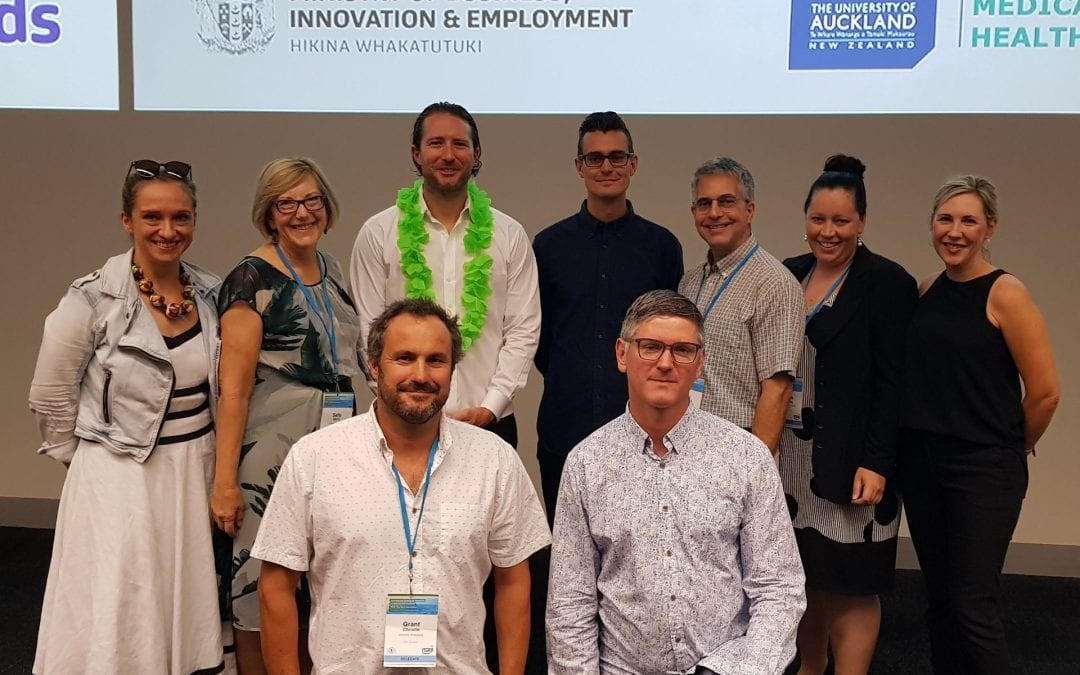(Picture caption: HABITs team ready to present at ISRII 2019, hosted at The University of Auckland. Back row, from left: Karolina Stasiak, Sally Merry, Chester Holt-Quick, Stephen Horner – Rush Digital, Jim Warren, Sarah Hopkins, Sarah Hetrick. Front row: Grant Christie, Stephen Knightly – InGame Limited.)
More than half of young people never access professional help for mental health issues.
A Better Start’s Resilient Teens team (HABITs) have been moving towards changing this by working with Māori and Pacific students, schools and communities to co-design and test a digital platform to offer young people and their families’ easier access to evidence-based help and advice to maintain good mental health.
At the recent International Society for Research on Internet Interventions (ISRII) conference, hosted by The University of Auckland in February, HABITs and associated research on digital tools for parents of younger children was featured, and shared across three different symposia at the conference.
Study Manager for HABITs Dr Sarah Hopkins says the HABITs team have been working really hard in the last past three years on wide-ranging stakeholder engagement, co-design and development of the components and framework for the HABITs ecosystem and were excited about sharing their findings.
“We have now reached an exciting phase of rapid testing and evaluation and are positioned well to share our experiences with an international audience,” Sarah says.
A well regarded international organisation, ISRII is one the HABITs team has had extensive involvement with, so it was an ideal opportunity to share the information, she adds.
“It was a chance to present and discuss the HABITs research with the best and brightest of researchers from around the globe, who lead research on the use of digital technologies for behavioural, psychosocial, health and mental health outcomes,” Sarah says.
HABITs team members Dr Karolina Stasiak and Dr Terry Fleming co-hosted the conference at The University of Auckland, which featured insightful key-note speakers including former New Zealander of the Year Dr Lance O’Sullivan, and HABITs lead researcher Professor Sally Merry.
Sally’s keynote address, “You can take a horse to water…Lessons learned and next steps in realising the promise and addressing the challenges of mental health” was the featured talk of the final morning of the conference and provided a fitting finale to three days of thoughtful discussion around the potential uses and challenges of digital interventions.
A number of our junior researchers presented together in a symposium called “Through a diverse cultural lens: the next generation approaches to engagement and co-design”.
This symposium fit well into the theme of diversity and indigeneity in digital interventions, one of the themes of the conference.
Talks focused on using Māori values as a framework; Pasifika stance on co-design; the personalisation of app-based treatment for young people in substance use recovery; and a bicultural approach to addressing mental health and lifestyle issues in Te Tai Tokerau youth.
On the final day of the conference, some of the core HABITs team presented “HABITs: an integrated approach to improving the mental health of young people through technology”, chaired by Sally.
An overview of the large multicultural research team was provided during this symposium, as was the agile co-design approaches taken, the components of the HABITs system and how the team envisage it might be used by families, communities, schools and others in New Zealand.
Among the various speakers was Sarah – who presented “Check it, choose it, change it: a digital ecosystem for youth mental health” – an overview of the HABITs system and presenting a typical user experience through our three step web portal; and Professor Jim Warren, who presented “A web platform for a youth mental health ecosystem”.
Dr Grant Christie, who is part of the team developing an emotional health app for younger teens, spoke about “Gamifying CBT to deliver emotional health treatment to young people – trials, triumphs and tribulations”, while Tania Cargo and Stephen Horner presented “AROHA, A chatbot who can. Supporting Kiwi teens to navigate mental wellbeing.”
Associate Professor and Theme Leader Sarah Hetrick presented “Managing risky behaviours: clinicians and young people working together via digital technology”, focused on her work on a recovery and treatment support tool for young people.
At an earlier symposium on indigeneity in co-design, Dr Matt Shepherd, provided a presentation on “Ensuring cultural applicability for an emotional health treatment app for rangatahi”.
His talk described steps taken to ensure cultural applicability of HABITs intervention tools for rangatahi and their whānau.
Associated research and development on digital tools for the parents of younger children (2-5 years) was also included in the conference, including presentations from both development and evaluation teams for Pasifika app “Play Kindly”.
Conference attendees utilised the opportunity to connect with fellow researchers and those interested in the Resilient Teens science theme, making it a successful event.
Visit HERE for more information on Resilient Teens.

